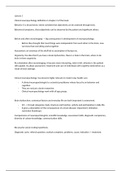Lecture 1
Clinical neuropsychology definition in chapter 2 of the book.
Behavior in a broad sense, latent variables that objectively can be assessed through tests.
Behavioral symptoms, that subjectively can be observed by the patient and significant others.
Before and after neuroimaging - > big consequence in development of neuropsychology.
- Before they thought that most things were independent from each other in the brain, now
we know that everything works together.
Assessment; on evenness of the skull led to assumption of bumps etc.
Organicity; the idea that if you have a brain dysfunction, there is a hole in the brain, where in de
brain is there organicity.
Re-orientation after neuroimaging; it became more interesting, what is left, whereto is the patient
still capable. Its about assessment, treatment and care of individuals with cognitive dysfunction as a
result of brain damage.
Clinical neuropsychology; has become highly relevant in modern-day health care.
- A clinical neuropsychologist is a scientist practitioner whose focus lie on behavior and
cognition.
- They are not just a brain researcher.
- Clinical neuropsychology work with all age groups.
Brain dysfunction, contextual factors and everyday life are both important is assessment.
- ICF -> 3 broad categories; body structure and function, activity and participation in daily life.
- It gives a description of the consequences of a brain disease; impairment, limitation,
restriction (handicap).
Competencies of neuropsychologists; scientific knowledge, assessment skills, diagnostic competency,
diversity of culture knowledge, communication skills.
Bio-psycho-social; testing hypothesis.
Diagnostic cycle; referral question; analysis complains, problems, cause, indication -> treatment.
,Lecture 2 Amnesia and other alcohol related cognitive disorders
Memory; definition; the ability to encode information, store it and retrieve it.
Encoding-> storage-> retrieval (everyday memory problems)
The atkinson-shiffrin model of memory
Working memory system (short term)
Long term memory (declarative (explicit) and non-declarative memory)
Episodic -> personal past experiences, what where and when of an event
Semantic memory -> general knowledge, facts, no idea when we acquired that information for the
first time
The whole brain is involved in human memory. Hippocampus, most likely to be recognized as a
human memory structure, but also the prefrontal cerebral cortex for working memory.
Baddeley’s model; different processes operate parallel, central executive is more important here.
Phonological loop -> digital tasks, sequences repetition, sequences get longer and this a way to
access this
Visuospatial sketchpad-> Once the information is no longer active, the info is no longer part of the
working memory, it has a limited capacity, about 7 units.
The dorsolateral prefrontal lobe, important for working memory processing, maintenance of
information (short term)
Episode; event form our personal past, in order to create these, associative processing is nessecary.
Binding has to take place, during short term already going on, episodic buffer (long term memory and
coding, retrieval for previous encoded knowledge)
Episodic buffer; hold info that not fits in loop or sketchpad. Transition from WM to long term.
If the hippocampus does not process the temporary held information, this info will not be stored.
Consolidation; actual long term storing process,
Standard consolidation model; after encoding, information retained in hippocampus and neocortex,
information recall strengthens the cortico-cortical connections, making the memory hippocampus
independent, permanently stored in neocortex
Multiple trace theory; based on distinction semantic and episodic memory, hippocampus always
involved in retrieval and storage of episodic memories, semantic memories stored in neocortex
, Binding device; linking item memory (the content) to source memory (the source).
Disorder; anterograde amnesia (amnesic syndrome)
Two forms;
- Hippocampal temporal variant (Dory, only able to process info in the here and now) (patient
H.M.), deficit in forming long term memory!
o No longer able to form new memories
o Encoding and consolidation of new facts is impaired
o Intact working and short term memory
o Can rise after encephalitis, or brain injury
o H.M. had neurosurgery which he needed for his epilepsy
- Diencepahlic variant (Korsakoff’s syndrome)
o Confusenal state, Wernicke psychosis
o Frontal and diencephalic damage as a result of chronic vitamin B1 deficiency
o Often cause by chronic alcohol abuse and poor nutrition
o Personality changes with irritability or apathy withdrawal
o They come up with stories that not compare to time, lack of insight
o Executive dysfunction, problems with more higher order cognitive processing,
planning etc.
o Anterograde amnesia; inability to conform new memories
o Retrograde amnesia; inability to retrieve memories from before Korsakoff
o Contextual memory; problems with placing memories in time, no detailed, or
incorrectly links to event from the past, not faking, just wrongly placing details
o Proactive interference; old memories disturb new ones, elements from story A are
coming into story B
o Retroactive interference; recent memories disturb older memories, elements from
story B interfere with the previous told story A
o Temporal gradient in memory; distant autobiographical memories, memories from
the more distant past are recalled better, than memories from the recent past
o The more recent the memories, the harder to recall for the patients
Reminiscence bump; the most memories from between 15 and 20 years old. Neural optimum at this
time, fully developed, after that neurons get lost, memories from this time are stored and retrieved
at the highest level. Also important life events happen. Also more first encounters; novelty effect.
Childhood amnesia, nobody has episodic memories from before 4 years old.
Remote memory; temporal gradient, memory from the distant past
Retrograde amnesia; complete memory loss
Anterograde amnesia; disruption in learning and retention of new information after accident
However, Short term memory is not impaired. Intact long term memory for skills and priming, and
emotional memory. Flashbulb memories; emotional tagging (9/11, amygdala).
The effects of alcohol on the brain in general;
- 50 percent of people with alcohol use disorder have cognitive impairments
- Only 10 has severe cognitive impairments (Korsakoff)






